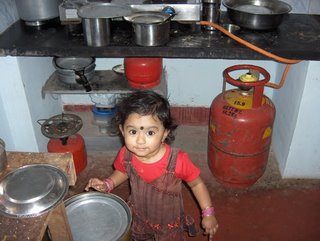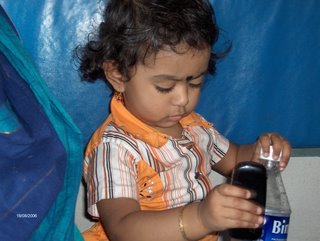



A child raised on anger, hatred and  violent discipline learns that his basic, inborn, inherent signals, the instincts that lead him to display the full range of rasas, are all wrong. This negative feedback toward his most natural, instinctive behavior causes him, in turn, to lose trust in himself and in others. The final outcome is a suspicious, doubtful, cold, emotionally dead and ruined adult who has chronically low self-esteem. What parents can do When the display of negative rasas by children gets out of hand, there are certain positive things that parents can do: • Take a few deep breaths. • Commit to loving the child without conditions.
violent discipline learns that his basic, inborn, inherent signals, the instincts that lead him to display the full range of rasas, are all wrong. This negative feedback toward his most natural, instinctive behavior causes him, in turn, to lose trust in himself and in others. The final outcome is a suspicious, doubtful, cold, emotionally dead and ruined adult who has chronically low self-esteem. What parents can do When the display of negative rasas by children gets out of hand, there are certain positive things that parents can do: • Take a few deep breaths. • Commit to loving the child without conditions.
Be firm, yet remain flexible to the child’s needs of the moment.
• See the child for what he is—just a small child in need of support.
• Impose no grown-up values and expectations on the child.
• See the display of rasa for what it is–a little storm in a tiny tea cup, which will calm down eventually.
• At the peak of the display of negative rasas, do not force the child to change his ways or engage with him in a forceful manner. A calm voice and a firm but peaceful manner is a stronger weapon than force.
• Do not, do not, do not suppress, neglect, ignore, put down, discourage, degrade or humiliate the child when he is displaying any sign of a positive rasa. While excessive praise is detrimental, so are neglect and discouragement.
• At no point are violent physical punishments, frightening time-outs, deprivation or verbal abuse called for. These negative devices affect children for the rest of their lives.
• Focus on cultivating tolerance and patience in yourself. Treat the child as you would expect him to treat you when you grow old, powerless, dependent and needy. Talk to your child about the expression of positive rasas when the time is right. In the meantime, just show him by the example of your own behavior how the expression of positive rasas brings joy to the family.
• Set a family time—free from technology—to create an ideal environment for cultivating your child and teaching him about the display of positive rasas. Soon enough you will be able to speak to the child about the universal laws of righteous behavior. Every being has the desire to be treated with love, courtesy, kindness, loyalty, generosity, consideration and warmth. While being taught to extend this treatment to one and all, the child will also need to be told about discretion. For example, loyalty is a good quality but the child must learn to choose his company wisely. If he befriends a drug pusher and becomes loyal to him, his loyalty to this friendship will quickly take him right down the drain and into the infected tank. This is where discretion comes in. When all is said and done, nobody can deny that these are challenging times for parents. Rootlessness, alienation, marginalization and anonymity—these are some of the prices parents pay when they move around the world in search of the perfect situation. Techno-commercial values constantly push parents and children to test one another. In pursuit of their individual ambitions and needs, parents and children often live in separate worlds, even though in the same house-hold. And when children enter school, the child who has not been given time to be a child, who has not been accepted with tolerance, often ends up in the school being tested for and diagnosed with illnesses such as bipolar disorder, ADHD or oppositional defiant disorder. harassed teachers, under pressure to maintain order in their classrooms and to have their students meet minimum academic standards, expect all of the children to behave like obedient, quiet, perfect, little ladies and gentlemen. Children are not allowed to be children. They are not allowed to deviate from the norm or to freely express all of their rasas. Sometimes as early as the age of three or four, children are labeled with psychiatric diagnoses and begin to be treated with powerful drugs such as lithium or Depakote (mood stabilizers), risperdal, Seroquel or Zyprexa (atypical antipsychotics), Prozac (an antidepressant) or ritalin (a drug for ADHD). Each of these drugs comes with a frightening list of side effects. If prescribed without any physical markers, but solely on the basis of behavior—or rather the display of rasas—what well (or harm) is being done to the child, the parents and society? In the face of this, it becomes all the more imperative that parents consider other, more holistic approaches to child rearing. If, as is sometimes the case, the child’s display of rasas becomes detrimental to his own or his family’s well-being, there are scores of other, non-pharmaceutical options available for modifying mood and behavior. His parents might explore changing his diet, limiting his intake of sugar, preservatives and additives. Calming and healing herbs might help. Perhaps homeopathy could shift his energetic balance or counseling for the entire family could diffuse the situation. Training a child in martial arts, classical music or classical dance could help. All of these disciplines have been known to stabilize and channel excessive or disruptive energy in more positive directions. A regular TV-free time when family members sit together, work together and converse with one another is also known to provide lasting positive change for children. As children grow up and display rasas, parents need to continue to grow up as well—not just in the physical manifestations of age, the wrinkles and gray hair, but in wisdom. This is what a study of the display of rasas in childhood is all about: a call for parents to monitor the growth of their wisdom. When parents learn to take charge of their own growth in terms of tolerance and empathy and resolve to let children be children first, allowing them an age appropriate display of rasas, they have an opportunity to become truly close to their children and know them in their totality. As children mature, good parents take the initiative for gently channeling their rasas at the appropriate time and place. When parents take this positive approach towards the child. The options of violent discipline and drug based treatments become obsolete. While we continue to ponder who is raising whom, learning to flow with the rasas will bring about lasting peace and joy in many households.
The End




 violent discipline learns that his basic, inborn, inherent signals, the instincts that lead him to display the full range of rasas, are all wrong. This negative feedback toward his most natural, instinctive behavior causes him, in turn, to lose trust in himself and in others. The final outcome is a suspicious, doubtful, cold, emotionally dead and ruined adult who has chronically low self-esteem. What parents can do When the display of negative rasas by children gets out of hand, there are certain positive things that parents can do: • Take a few deep breaths. • Commit to loving the child without conditions.
violent discipline learns that his basic, inborn, inherent signals, the instincts that lead him to display the full range of rasas, are all wrong. This negative feedback toward his most natural, instinctive behavior causes him, in turn, to lose trust in himself and in others. The final outcome is a suspicious, doubtful, cold, emotionally dead and ruined adult who has chronically low self-esteem. What parents can do When the display of negative rasas by children gets out of hand, there are certain positive things that parents can do: • Take a few deep breaths. • Commit to loving the child without conditions.

0 Comments:
Post a Comment
Subscribe to Post Comments [Atom]
<< Home